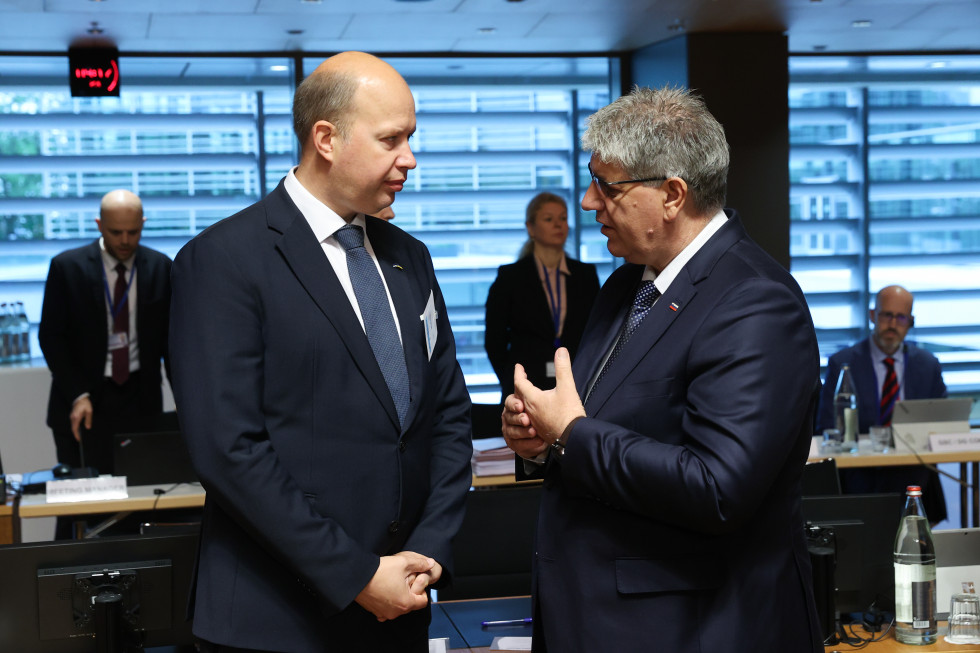EU interior ministers discuss Schengen and return policy in Luxembourg
The EU interior ministers began the meeting with a working breakfast, at which they discussed the impact of the current geopolitical situation on the EU's internal security, with a focus on the situation in Gaza. The ministers welcomed the latest developments, but simultaneously pointed out the need to monitor developments in the coming period, particularly in terms of potential security and migration risks. They stressed the importance of the ongoing exchange of information and analysis.
The meeting agenda also included the political management of the Schengen area. The European Commission presented the Schengen Barometer, an overview of the current situation in the Schengen area. The Council held a discussion on the future of Frontex. In recent years, Frontex has proven its capacity to operate effectively in challenging situations. "Our task now is to help shape its further development," said Minister Poklukar, adding that we must ensure that the announced expansion of the standing corps does not adversely affect the work and capacity of police forces at the national level and that the methodology determining the number of deployments to the standing corps each member state must ensure should be reviewed and amended carefully. In this regard, the Minister called for the introduction of a fairer system of deployment financing that would be stimulating for police officers and member states alike. He also noted on joint public procurement of equipment as added value where EU can demonstrate its strength of networking and rationality.
The Minister also stressed that Frontex must remain faithful to its core mission, which is to support the member states in managing external borders and returns. Slovenia also sees Frontex' added value in strengthening the pre-return activities and the expansion of Frontex's mandate to cooperate with third countries on returns to other third countries.
The ministers also held a political discussion on the proposal for a regulation on the return of third-country nationals staying illegally in the EU, where the Minister called for effective, sustainable, and practicable solutions. This also applies to the concept of mutual recognition of return decisions, whereby the aim is to ensure that a return cannot be avoided simply by moving to another member state, and that returns are as swift and effective as possible. Minister Poklukar also emphasized the importance of a balanced approach to the common European return system that combines swift and efficient procedures with the protection of individuals' rights and clear technical and legal standards.
During their working lunch ministers discussed returns to Syria. At the meeting, they also discussed access to data for effective criminal prosecution and the implementation of the project on the interoperability of information systems. The European Commission and EU-Lisa reported on the introduction of the Entry Exit System, which started operating at the EU's external borders on 12 October 2025. Slovenia launched the system successfully, and the first passenger registrations went smoothly.
In the afternoon, the ministers will discuss the Union Civil Protection Mechanism (UCPM) and the Health Emergency Preparedness and Response. The proposal brings significant changes to the existing EU mechanism in the field of civil protection, which, in Slovenia's opinion, works well by promoting solidarity among member states in times of disaster. The Mechanism has already proven itself in the previous responses to disasters in and outside the EU. The European Commission's proposed changes must therefore be considered carefully and thoroughly. Slovenia believes that the central role of civil protection should be retained in the scope of the proposed regulation as well as EU's support to member states in the field of civil protection. Slovenia advocates for consistent respect of the humanitarian nature of civil protection and its humanitarian tasks, as derived from the Geneva Conventions, especially with further strengthening and development of capabilities within the Union Civil Protection Mechanism and in proposals related to civil-military cooperation, including dual use. The dividing lines between the tasks of the existing Emergency Response Coordination Centre and the new hub should be clearly defined, and clear boundaries set between the civil protection and public health policy.

At the meeting of EU interior ministers in Luxembourg | Author European Union

